Vegan in the Kuma Valley: A Rural Shift Toward Plant-Based Cuisine
Explore how a quiet corner of Japan is leading the way in plant-based dining, from ryokan kaiseki to farm-to-table cooking.
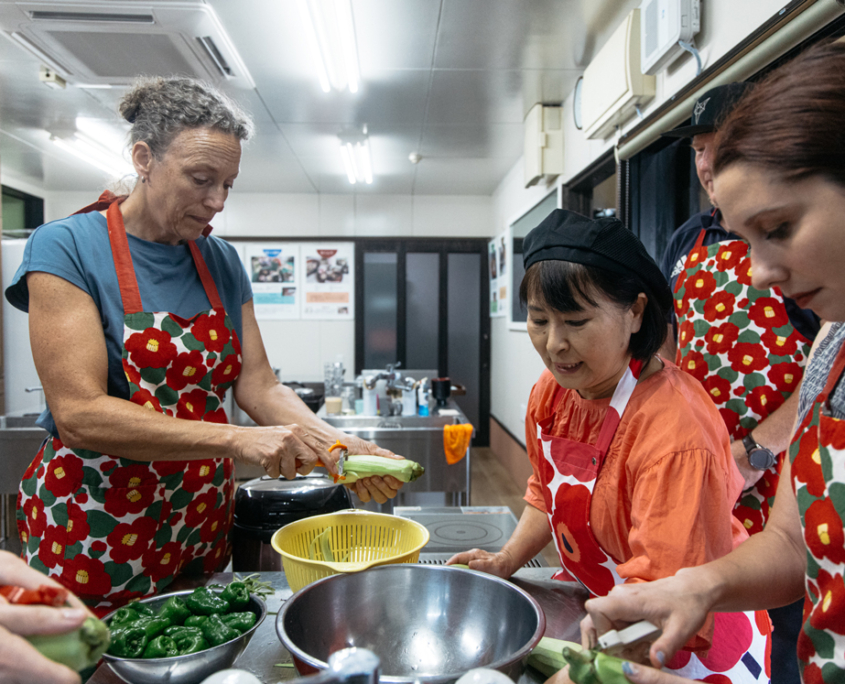
Japan has long been known for its centuries-old Buddhist temple cuisine (shōjin ryōri), which naturally avoids animal products, and for centuries consumption of non-seafood animal products was largely prohibited. Yet, modern Japanese dining culture, shaped by Meiji-era Westernization and post-war industrialization, has been heavily meat-centric. As a result, until recently, plant-based diets were often misunderstood or overlooked, largely due to the lingering perception of meat as a symbol of modern progress and good nutrition.
However, the past few years have seen a growing awareness of dietary diversity, fueled by a broader ‘Food Diversity’ movement aimed at making Japan more accommodating to religious, ethical, and health-based dietary preferences. Major cities have started adapting—but now, even rural regions like Hitoyoshi-Kuma are getting on board.
The Hitoyoshi-Kuma Tourism Community Development Council has spearheaded a project encouraging local restaurants and hotels to develop entirely new plant-based menus, bringing vegan options to a place where, not too long ago, simply explaining the concept could have been a challenge.
Japanese Vegan Cooking Class at Himawari-Tei

Tucked away in a beautifully restored 120-year-old house, Himawari-Tei is a farm-to-table hideaway overlooking the Kuma River. Known for its commitment to seasonal, locally sourced ingredients, the café offers both vegan and non-vegan options, with a focus on traditional fermentation techniques and koji-based cooking.
Beyond just serving food, Himawari-Tei offers a hands-on vegan cooking class, where guests can explore the depth of Japanese plant-based cuisine. Who knew that taro and wood-ear mushrooms could make the perfect gyoza filling, or that fermented onions with rice koji could create the most umami-packed onion soup?
What to Expect from the Cooking Class
Led by chef Sechan, the Taste of the Kuma Valley class is an immersive way to connect with the region’s ingredients. The session includes:
✔ Hands-on Cooking – Learn how to prepare authentic vegan Kuma Valley dishes using fresh, locally sourced produce.
✔ Lunch with a View – Enjoy the dishes you’ve prepared in the tranquil setting of Himawari-Tei.
✔ Local Culinary Wisdom – Gain insight into koji fermentation and traditional cooking techniques from a chef passionate about sustainability.
Class Details
📍 Location: Himawari-Tei
👥 Participants: 2–8 people
⏳ Duration: 10:00 AM – 2:00 PM
💴 Price: ¥10,000 per person
🌐 More Info & Booking: Taste of the Kuma Valley at Himawari-Tei
Whether you’re a dedicated vegan, a fermentation enthusiast, or just someone who enjoys good food, this class offers a rare glimpse into rural Japanese cooking that goes far beyond tofu and miso soup.
Two-Day Farm Stay & Culinary Adventure at Ryukinka
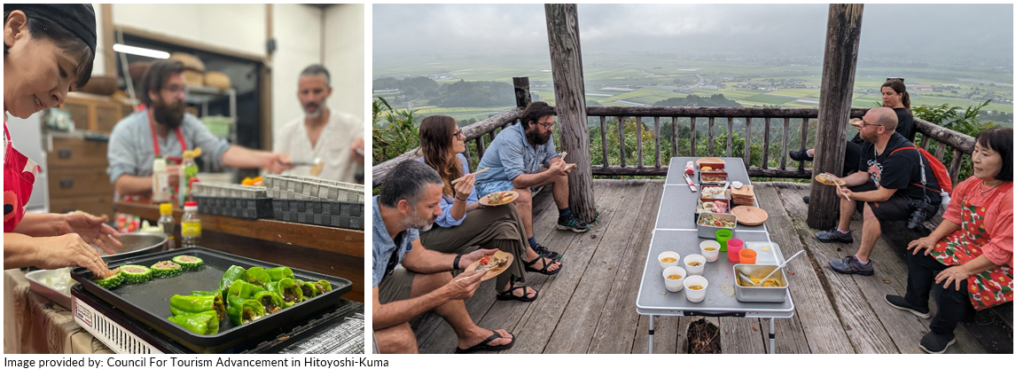
For those looking to immerse themselves in rural life, Ryukinka offers a two-day farm stay and cooking experience with local chef Sechan.
Day 1: Farm-to-Table Cooking
Arrive at Ryukinka, a small farm stay tucked into the Kuma Valley, and spend the afternoon harvesting seasonal ingredients before joining Sechan in the kitchen. The cooking class focuses on traditional Kuma Valley techniques, using ingredients that have been locally grown or foraged. Dinner, naturally, consists of whatever you’ve just prepared.
Day 2: Samurai Trails & Breakfast with a View
Morning starts early with a home-cooked breakfast before setting off on a hike along ancient samurai trails, leading to the ruins of a historic castle. Once there, another Kuma-style breakfast spread is served—because why have just one breakfast when you can have two?
The Basics
👥 Participants: 2–8 people
⏳ Duration: Day 1 (15:00–20:00), Day 2 (7:00–10:00)
💴 Price: ¥32,000 per person
📍 Includes: Cooking class, dinner, farm stay, guide, hike, breakfast
🌐 More Info & Booking: https://hitoyoshikuma-guide.com/en/foodie_adventures/
Ayu No Sato: Hitoyoshi’s Premier Ryokan Goes Vegan

Ayu No Sato is one of Hitoyoshi’s top ryokans, known for private onsen baths overlooking the Kuma River and an attention to culinary detail that goes beyond the standard kaiseki fare. While its name nods to the region’s famed ayu (sweetfish), the inn has expanded its offerings to include fully vegan Western and Japanese-style meals—a rarity in traditional ryokan dining.
The vegan course, crafted with seasonal, locally sourced ingredients, follows the same philosophy as the ryokan’s standard menu: highlighting the pure, natural flavors of each ingredient. Even the bar has joined in, offering vegan-friendly Kuma Shochu and cocktails.
✔ Private riverside onsen baths
✔ Vegan breakfast and course-meal dinner, available by request (with both Western and Japanese options)
✔ Vegan-friendly cocktails featuring Kuma Shochu
For those looking to soak and dine in style, Ayu No Sato now caters to a wider range of guests—without sacrificing the craftsmanship it’s known for.
For more information see…
– The official website: https://www.ayunosato.jp/en/
– Their HappyCow profile: https://www.happycow.net/reviews/ryokan-ayunosato-hitoyoshi-197735
Chanomi: A Farmhouse Stay with Homegrown Vegan Meals
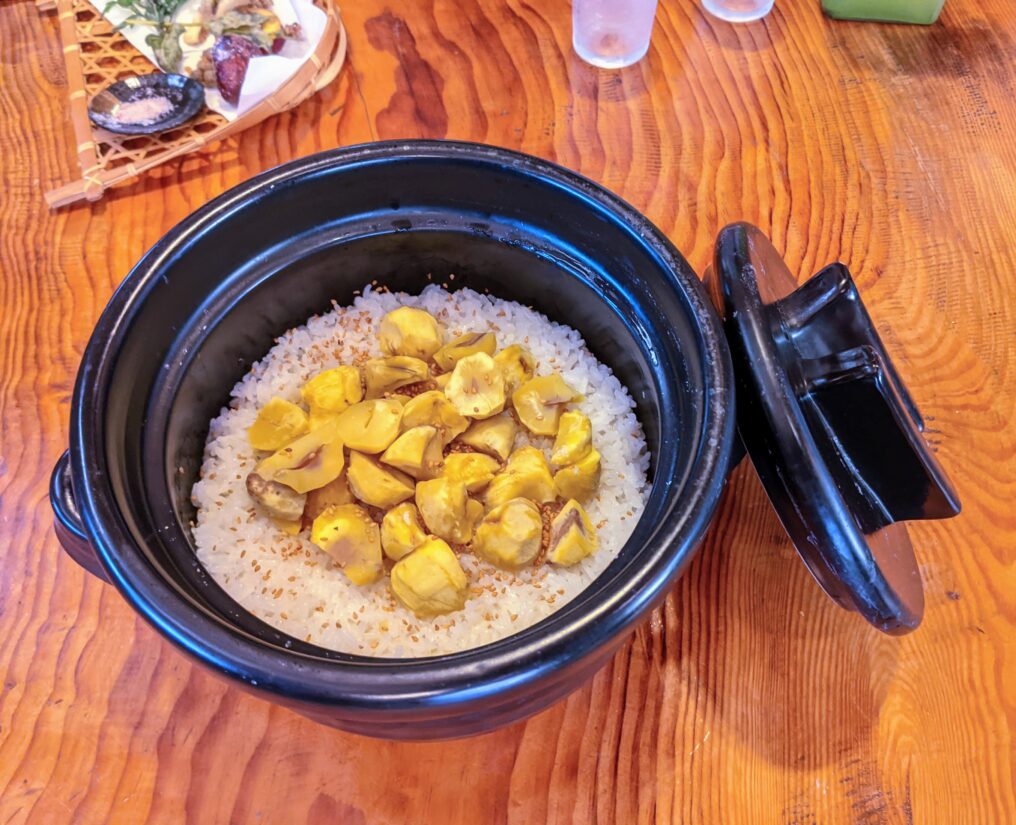
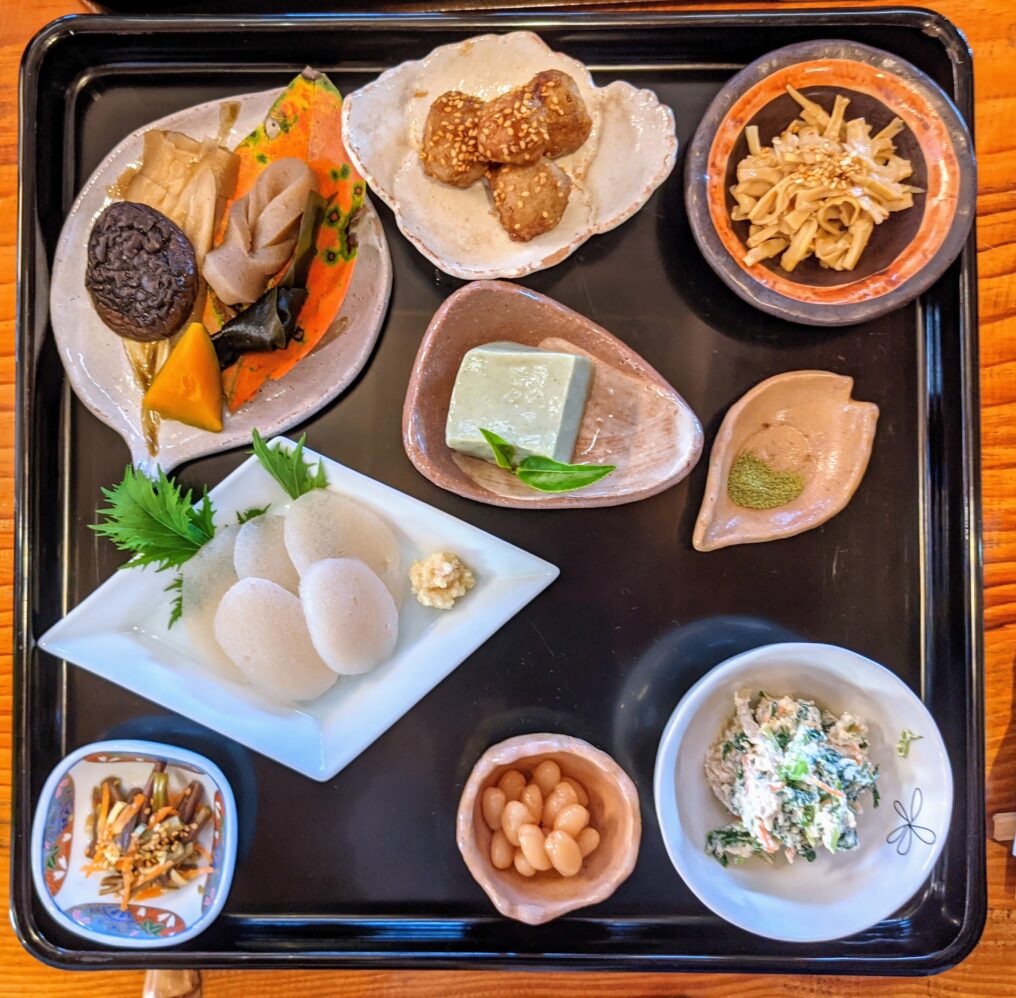
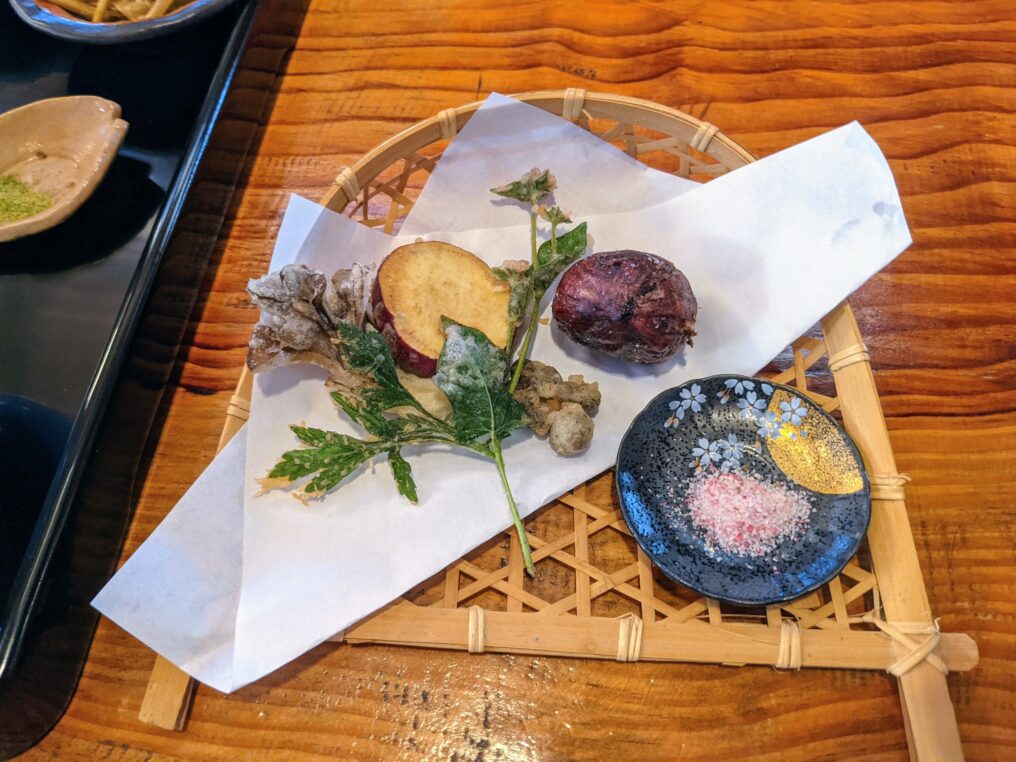
For those looking to escape the usual ryokan routine, Chanomi (農家の宿 茶乃実) offers something different: a nōhaku (farm stay) experience in the tea-covered hills of Mizukami Village. The guesthouse, once a converted cowshed, is run by a dedicated tea farmer with over 20 years of experience growing pesticide-free tea and organic produce.
What sets Chanomi apart? Upon request, they are now able to prepare handmade vegan breakfasts and dinners, made almost entirely from ingredients grown on-site—seasonal vegetables, mushrooms, rice, and fruits from the surrounding mountains. Meals are thoughtfully prepared with an emphasis on balance and simplicity. Depending on what’s in season, guests can also harvest bamboo shoots and shiitake mushrooms for their dinner if they want a more hands-on approach.
✔ Stay in a working tea farm at 380m elevation
✔ Vegan farm-to-table meals made with organic, homegrown produce
✔ Tea tasting with the host upon arrival
✔ Optional foraging experiences for seasonal ingredients
Accommodating solo travelers, couples, and groups of up to 10, Chanomi is a quiet retreat far from the usual tourist circuits—but close enough to civilization if you need a quick onsen break.
Hotel Sun Hitoyoshi: Vegan Dining in the City Center
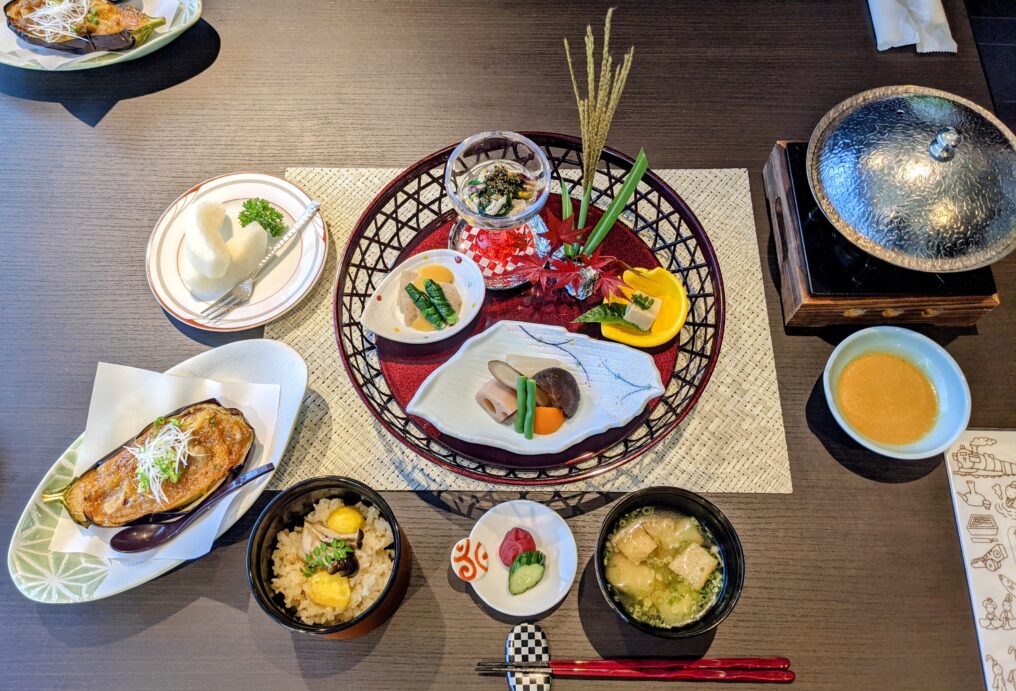
A well-established city hotel facing the Kuma River, Hotel Sun Hitoyoshi has added vegan-friendly options to its in-house restaurant menu—something still rare in rural Japan. While the hotel serves both meat and plant-based dishes, guests can now enjoy a vegan course meal for breakfast and lunch upon request.
✔ Vegan breakfast and lunch course available by reservation
✔ Seasonal vegetable dishes, including eggplant specialties and hot pot (nabe)
✔ Centrally located in downtown Hitoyoshi
📍 Address: 人吉市上青井町 166
🕒 Hours: 6:00 PM – 8:00 PM (daily)
📞 Reservations required
For travelers who prefer the convenience of a city hotel while still wanting thoughtfully prepared plant-based meals, this is a solid option.
Oyaji no Ganko Tofu: Vegan Bento & Ganmo Burgers

A specialty tofu shop with a bit of an attitude, Oyaji no Ganko Tofu takes tofu seriously—without taking itself too seriously. Known for its handmade ganmodoki (fried tofu cakes), the shop has expanded into vegan-friendly bento meals and a ganmo-based hamburger that’s surprisingly satisfying.
The bento features an array of locally sourced, plant-based ingredients, carefully prepared to highlight the subtle depth of tofu-based cuisine. The deep-fried ganmodoki is a standout, as is the yuba pudding dessert, which has gained a bit of a following. Meals are served in eco-friendly paper boxes, sticking to the shop’s commitment to sustainability and simplicity.
For those looking for a casual yet well-executed plant-based meal, this is a solid option.
Vegan-Certified Shochu: Hayashi & Fukano Distilleries
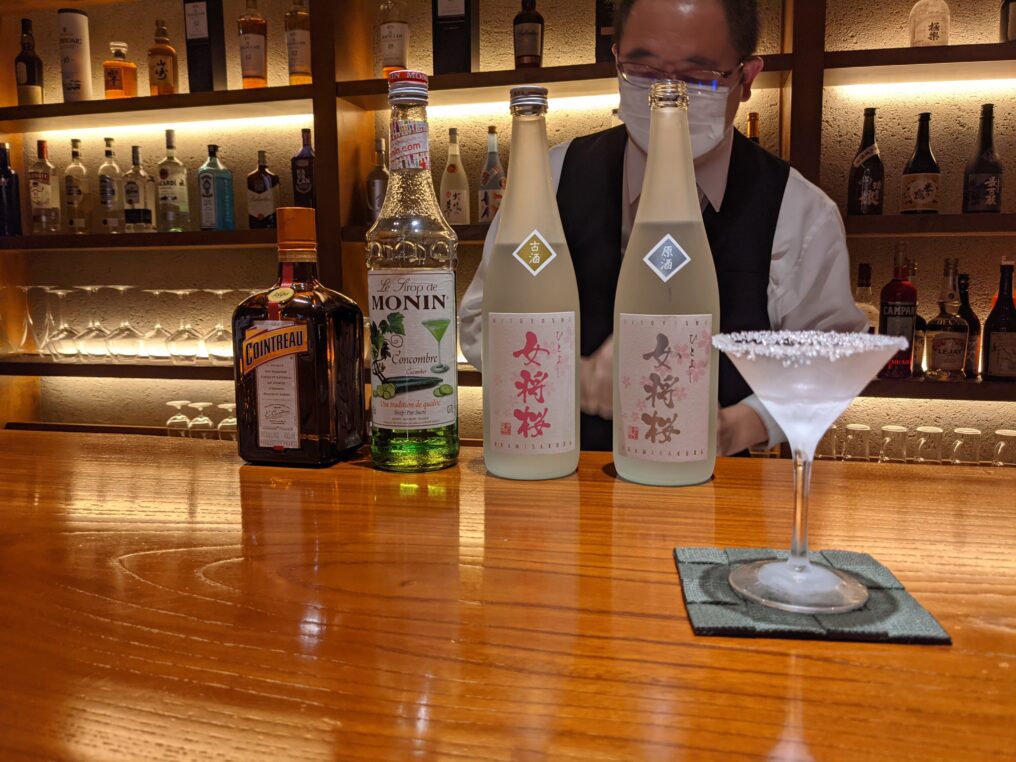
For those who like their drinks plant-based and ethically sourced, Hayashi Shuzo and Fukano Brewery, among others, offer vegan-certified Kuma Shochu. Although authentic shochu does not contain animal products, sometimes crustacean-derived shells can form part of the filter used in the filtration process, disqualifying it from being purely vegan. These products grab onto the impurities and make it easier to catch them in the filters, though there are many animal-free alternatives in use.
Hayashi Shuzo: Tradition Meets Vegan Innovation
Hayashi Shuzo, one of Kuma Shochu’s 27 distilleries, has been in the game since the mid–Edo period, producing the Gokuraku series of shochu. While still rooted in tradition, the 15th-generation master has embraced modern techniques, and gone through the process to become fully vegan-certified by Vegi Project Japan.
Notable bottles include:
✔ Gokuraku Mikazuki-hime no Namida – A dramatic name translating to The Tears of the Crescent Moon Princess, perfect for when you want a drink with a backstory.
✔ Gokuraku Jо̄atsu & Gen’atsu – In traditional atmospheric and vacuum-distilled versions for those who want to carefully compare the two distillation methods.
Fukano Brewery: 200 Years of Rice Shochu, Now Vegan
Founded in 1823, Fukano Brewery in Hitoyoshi City has been crafting rice shochu using traditional earthenware kame pots for generations. Known for its smooth, mellow flavor, Fukano took a step further in 2020, becoming the first distillery in the world to earn vegan certification for shochu.
Vegan in Hitoyoshi-Kuma: A Quiet Revolution
For a region known for castle ruins, river adventures, and onsen retreats, the emergence of thoughtfully crafted vegan dining adds another layer of accessibility for travelers with diverse dietary needs. Whether you’re here to do some shochu distillery tours, raft the Kuma River, or just take in the scenery, knowing that vegan-friendly meals are dotted across the region—from farm stays to ryokan dining—makes planning a little easier.
Interested in exploring more of what makes this region unique? Check out the rest of our Hitoyoshi-Kuma series:
🔹Hitoyoshi-Kuma Complete Guide: A Valley 700 Years in the Making – A broad look at the area’s history and geography.
🔹Top Things to Do in the Kuma Valley – Castles, rivers, samurai experiences, and bungee jumps—take your pick.
🔹10 Onsen in the Kuma Valley – Where to soak in the region’s onsen culture.
🔹Kuma Shochu: The Spirit of the Valley – Everything you need to know about the local rice shochu tradition.
For More on “Food-Diverse” Options including Vegan & Halal in Hitoyoshi-Kuma
✔ A Vegetarian/Vegan Town Rich in Seasonal Produce – Restaurant List (Hitoyoshi-Kuma Official Tourism Site)
✔ “Wellness x Sustainable” Vegan Foods To Be Enjoyed in Hitoyoshi (Food Diversity)
✔ Muslim-Friendly Travel Experiences in Hitoyoshi (Food Diversity)
For a rural region with so much else to do, it’s nice to know that finding a good meal—no matter your dietary preferences—isn’t going to be a struggle.


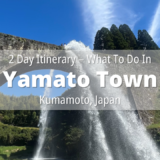

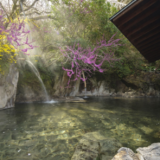
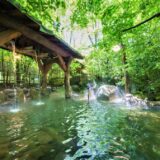



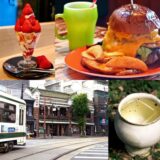

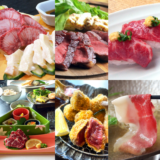
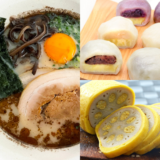
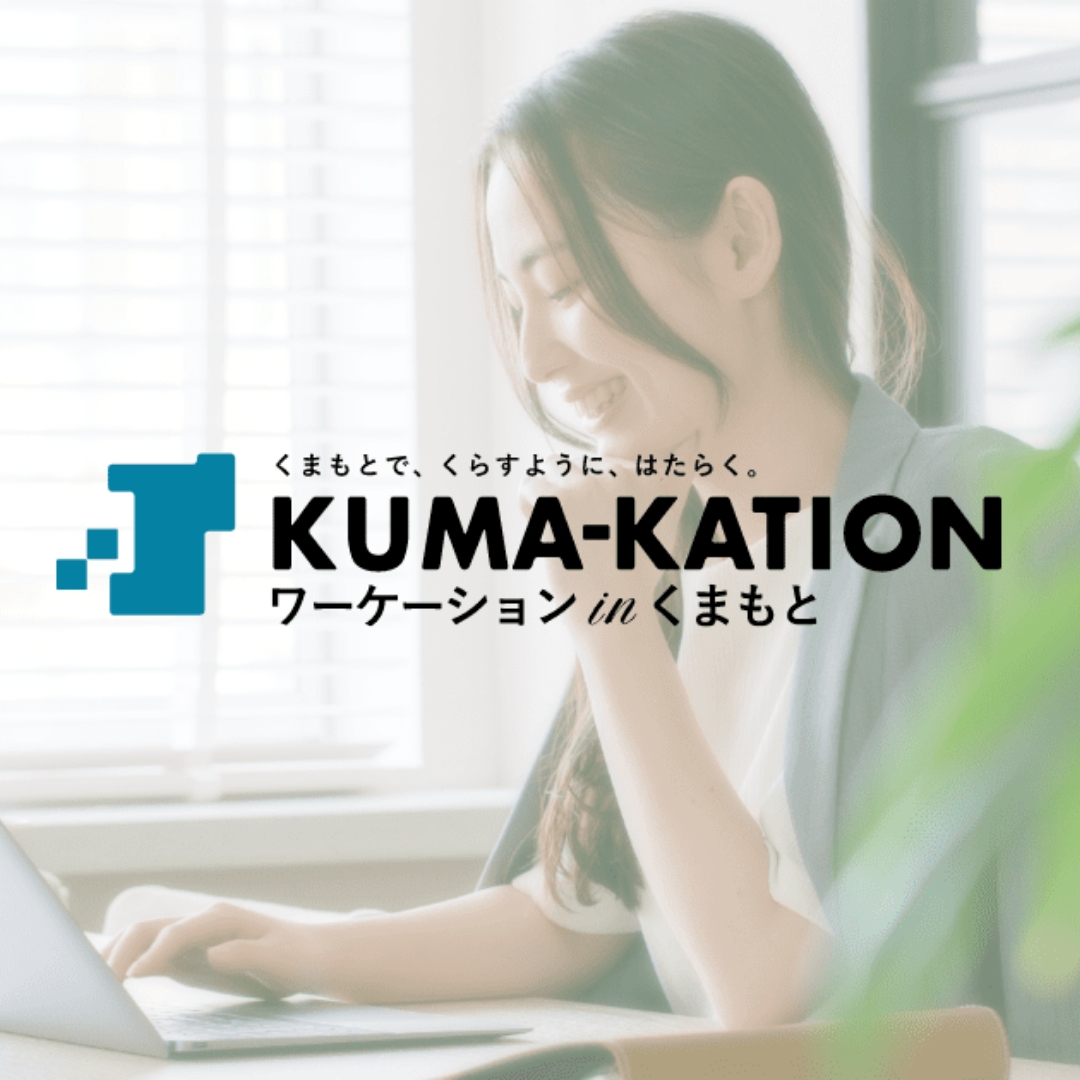
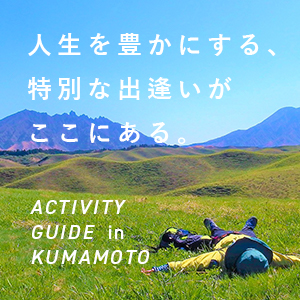


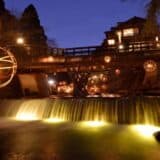

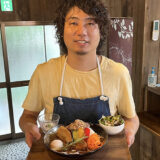
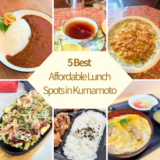
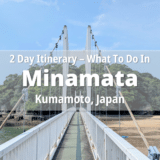
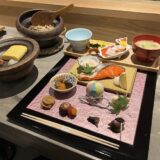




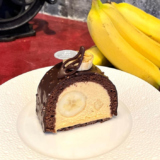



If you would like to comment, please do so below.